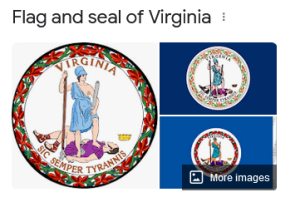Foreclosure is the legal process by which a lender can take possession of a property when a borrower fails to make their mortgage payments. Virginia has specific foreclosure laws that lenders must follow, which are designed to protect both borrowers and lenders. We will explain Virginia’s foreclosure laws in detail, provide statistics related to foreclosures in Virginia, and include sources and links to websites for further reading.
Virginia Foreclosure Laws:

Flag and seal of Virginia
In Virginia, lenders must follow a non-judicial foreclosure process, meaning they do not have to go to court to foreclose on a property. The foreclosure process begins with a notice of default sent to the borrower when they miss their first mortgage payment. The notice of default must include information about the amount owed, the right to cure the default, and the right to request a meeting with the lender.
The lender can schedule a foreclosure sale if the borrower does not satisfy the default within 30 days of receiving the notice. The foreclosure sale must be advertised in a local newspaper three weeks before the sale date. At the sale, the property is sold to the highest bidder, and the sale proceeds are used to pay off the outstanding mortgage balance. If the sale proceeds are insufficient to pay off the mortgage balance, the lender may be able to seek a deficiency judgment against the borrower.
Virginia Foreclosure Statistics:
According to CavaBuys, a real estate investor in Richmond VA, Virginia had 4,057 properties with foreclosure filings in 2021. This represents a 43% decrease from 2020 and a 76% decrease from 2019. Virginia’s foreclosure rate of 0.10% is lower than the national foreclosure rate of 0.16%.
Sources and Links:
- Virginia Legal Aid Society: Foreclosure Prevention: https://www.vlas.org/foreclosure-prevention/
- Virginia State Bar: Foreclosure: https://www.vsb.org/site/publications/foreclosure
- RealtyTrac: Virginia Foreclosure Trends and Statistics: https://www.realtytrac.com/statsandtrends/va/
- Virginia Department of Housing and Community Development: Foreclosure Prevention Resources: https://www.dhcd.virginia.gov/homeless-prevention-and-rapid-re-housing-program/hprp-resources/foreclosure-prevention-resources
There are several reasons why people may fall into foreclosure on their VA homes. Some of the main reasons include the following:
- Financial hardship: One of the most common reasons for foreclosure is a financial hardship, such as job loss, a reduction in income, or unexpected expenses like medical bills. When homeowners cannot make their mortgage payments, they may stay caught up and avoid foreclosure.
- Adjustable-rate mortgages (ARMs): Many homeowners with ARMs saw their mortgage payments increase significantly when interest rates rose, leading to an inability to make their mortgage payments and, ultimately, foreclosure.
- Home equity loans: Homeowners who take out a home equity loan may find themselves in a difficult financial situation if they need help to repay it. This can lead to timely mortgage payments and foreclosure.
- Fraudulent lending practices: Sometimes, homeowners may fall into foreclosure due to fraudulent lending practices. This can include predatory lending, where a lender provides a loan with unfavorable terms to the borrower, or mortgage fraud, where a borrower provides false information on their mortgage application.
- Natural disasters: Natural disasters, such as hurricanes or floods, can damage Richmond homes and cause homeowners to fall behind on their mortgage payments, leading to foreclosure.
It’s important to note that each situation is unique, and the reasons for foreclosure can be complex and multifaceted, especially in coastal areas like Virginia Beach. In many cases, it’s a combination of factors that ultimately leads to foreclosure.
Virginia foreclosure can be a difficult and stressful experience for homeowners. It’s essential to seek help early if you’re struggling to make your mortgage payments. There may be options to help you avoid foreclosures, such as loan modifications or forbearance agreements.
Virginia’s non-judicial foreclosure process requires lenders to follow specific rules when foreclosing on a property. Virginia’s foreclosure rate is lower than the national foreclosure rate, and resources are available to help homeowners prevent foreclosure.


